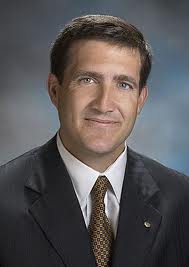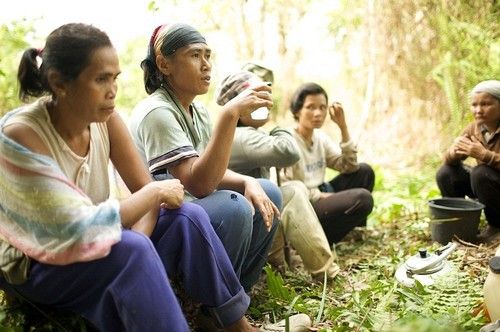Update 11/25/11 10:08am Despite key commitments to work with the RSPO to meet consumer demands, several key RSPO members are missing at this year’s RSPO meeting in Sabah, Malaysia. Has anyone recently seen Kellogg’s, McDonald’s or Girl Scouts USA? They were last seen buying palm oil with Cargill and making assurances to the public that it was not tied to deforestation, poor labor practices or human rights violations.
Kellogg’s:
Despite officially joining in 2008, Kellogg’s doesn’t appear to have ever completed the five basic questions in its membership application. We were unable to find their required annual progress reports, according to the minutes of last year’s General Assembly they did not vote on the resolutions, and weren’t sighted at last year’s RSPO conference at all. Again this year they were nowhere to be found. Kellogg’s told the public in its recent announcement:
“As a socially responsible company, Kellogg is committed to conducting our business in a way that reduces our environmental impact,” said Celeste A. Clark, Ph.D., Chief Sustainability Officer, Kellogg Company.
Apparently Kellogg’s commitment doesn’t extend to engaging with or verifying the effectiveness of the RSPO. Given that it sources palm oil from Cargill, a company with no safeguards on the palm oil it trades, this seems like a pretty flimsy guarantee to customers that the company takes its sustainability commitment seriously.
Girl Scouts:
Following extensive public concern about the use of palm oil in their iconic Girl Scout cookies, Girl Scouts USA recently made a “sustainable” palm oil commitment to cover its use of palm oil in dozens of popular Girl Scout cookie recipes. Despite having committed to the public the intent to “become affiliate members of the RSPO” and use the RSPO to guarantee that its products are not linked to rainforest destruction, representatives were nowhere to be found.
In fact, Girl Scouts USA seems to have created a new category of “affiliate membership” that is not one of the 7 official categories of RSPO membership. Hmmm.Perhaps by affiliate membership they mean they are relying on cookie bakers to effectively use their membership in the RSPO to guarantee that palm oil is not connected to rainforest destruction and orangutan habitat loss. Unfortunately we couldn’t confirm RSPO membership for either ABC Bakers or Weston Foods Limited, and the only Girl Scout cookie baker we did find was Kellogg. Pity given the above.
McDonald’s:
The newest RSPO member missing in action joined in October with great fanfare but was nowhere to be found despite having said:
“Participating in multi-stakeholder engagements such as the RSPO is one way for us to put the power and leadership of McDonald’s behind commitments to continue to source sustainable ingredients such as palm oil,” said Francesca DeBiase, McDonald’s vice president, Worldwide Strategic Sourcing, in a statement. “Sustainability issues as they relate to food are often confusing to consumers, and we can help lead the way by educating our customers on how our food is sourced.”



If we’re expecting these brands to assure that RSPO certified palm oil is truly responsible, perhaps next year we’ll have to put the photos of these missing companies on the back of milk boxes before the annual RSPO meeting.
Update 11/24/11 9:50am Whose Voices are Missing at the RSPO?
In concluding her plenary presentation yesterday, “A Preliminary consideration of workers and communities,” Toh su Mei from the organization Wild Asia, left participants of the 9th Roundtable on Sustainable Palm Oil meeting pondering the lack of representation of workers and smallholders at the conference.
“We are the stakeholders of the palm oil economy, but where are the workers in the room?” Her question to the room brought to light a notable emptiness among RSPO members and RSPO board members: palm oil workers.

There are an estimated 2 million Indonesians working in Malaysia for a variety of industries. Indonesia placed a moratorium on sending workers to Malaysia following widely reported abuse of Indonesian workers in the neighboring country where many are undocumented and work in palm oil plantations, construction and as domestic workers. But after two years of tough negotiations, involving the top leaders of both countries, Indonesia and Malaysia eventually overcame the protracted deadlock on the sending of unskilled Indonesian workers to Malaysia.
Migrant workers from Indonesia working on palm oil plantations may have their passports held and may be subject to multi-year contracts that push the workers into debt and prevent escape. As I documented just over a year ago, slave and child labor on palm oil plantations is a severe reality in Indonesia and Malaysia. So sever, in fact, that recently the U.S. Department of Labor added palm oil cultivated in Indonesia to its List of Goods Produced by Child Labor or Forced Labor.
Toh su Mei explained that migrant workers often aren’t allowed to organize or join unions or risk getting terminated. She encouraged the RSPO to reach out to local and migrant workers upon which the oil palm industry relies and to engage them in decision making processes that ultimately affect them but currently are run behind closed doors.
According to a 2009 publication on the Asia Pacific Mission for Migrants, here is summary of the issues facing migrant workers in Malaysia.
If the RSPO fails to meaningfully involve the workers it relies on to address these issues, another weakness will be added to a system that is already missing key safeguards relating to the industry’s greenhouse gas emissions, one that still fails to adequately implement key elements of the principles and criteria relating to social conflict and the conversion of natural forests.

Original Post: Malaysia Minister Slams NGOs for Using Science that Documents High Risk of Orangutan Extinction
On Tuesday, November 22, the Malaysian Minister of Plantation Industries and Commodities, a man named Tan Sri Bernard Giluk Dompok, delivered the Official Address in the Opening Ceremony of the Rountable on Sustainable Palm Oil (RSPO) conference. A significant portion of his comments expressed concern and disapproval of the style of campaigning RAN and other NGO’s use to draw attention to the social and environmental problems with palm oil.
But Mr. Dompok did more than simply acknowledge the campaigns of those concerned with deforestation, climate change, and declines in orangutan populations. He decided to snub science in front of 1,000 delegates from 34 countries, claiming that a 2007 report by the United Nations Environment Programme (UNEP), documenting the high risk of orangutan extinction due to deforestation, was baseless:
The development of the oil palm industry has never been without challenges. Environmental and consumer advocacy groups, particularly in Europe and US have stepped up claims that the oil palm sector is destroying large tracts of forests and encroaching on the natural habitats of endangered species. For example, a report entitled, “The Last Stand of the Orang Utan: State of Emergency,” claims that oil palm plantations are expanding so rapidly in the rainforests of Malaysia that almost no virgin forest will remain by 2022. It has been also claimed that an equivalent of 300 soccer fields are deforested every hour for oil palm plantations. I am of the view all these allegations are baseless and based on the premise of fear on the competitiveness of palm oil.
This statement comes just a week after the Malaysian Government announced its plans to spend $7.7 million (24 million ringgit) in 2011 and 2012 to counter criticism over the social and environmental impact of palm oil.
Directly after Mr. Dompok’s speech, I snuck into the Press Conference and sat in the front row. On camera, I asked Mr. Dompok why the Malaysian Government needed to spend over $7 million if the Malaysian palm oil industry was indeed so “sustainable.” His answer? That Malaysia needs to counter misleading NGO campaigns based on fear.
Indeed, the specter of the extinction of humankind’s closest relative, the orangutan, does elicit a sense of fear in many around the world. A comprehensive new study finds that orangutan populations in Indonesian Borneo are being diminished at unsustainable rates. The results indicate orangutans may be headed toward extinction. The study, published in PLoS One, is based on 18 months of interviews with nearly 7,000 people across 687 villages in areas where orangutans persist in East, Central, and West Kalimantan. The research involved 18 NGOs, including local and international organizations.
In a recent interview, Dr. Marc Ancrenanz of HUTAN notes that oil palm plantations cover a staggering 14,000 square kilometers of Sabah, one of the two states in Malaysian Borneo and the number one producer of Malaysian palm oil. This is equal to 20 Singapores planted solely with palm!
In the same interview, Dr. Marc Ancrenanz mentions that genetic studies in Sabah show that the orangutan population has declined by 50% to 90% over the past few decades. This severe decline is due to several causes, such as hunting and the illegal pet trade, but the foremost reason is forest loss as it is cut down and converted to agriculture.
So you be the judge. Do you trust the comments made by the Malaysian Minister following the government’s $7 million investment in a public relations campaign, or do you trust scientists working to save the endangered orangutan before it is too late? In my experience, when companies or governments spend $7,000,000 on public relations to counter science, it’s usually because they have something to cover up.